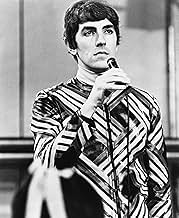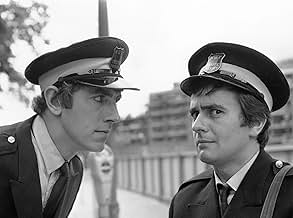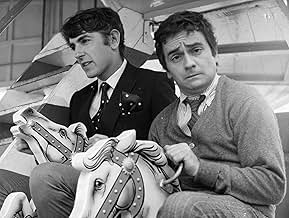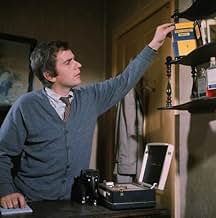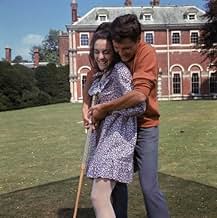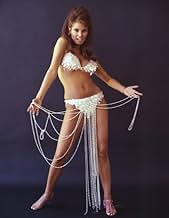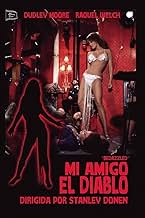VALUTAZIONE IMDb
6,7/10
10.142
LA TUA VALUTAZIONE
Un perdente vende la sua anima al Diavolo in cambio di sette desideri, ma ha difficoltà a conquistare la ragazza dei suoi sogni.Un perdente vende la sua anima al Diavolo in cambio di sette desideri, ma ha difficoltà a conquistare la ragazza dei suoi sogni.Un perdente vende la sua anima al Diavolo in cambio di sette desideri, ma ha difficoltà a conquistare la ragazza dei suoi sogni.
Danièle Noël
- Avarice
- (as Daniele Noel)
Recensioni in evidenza
Just watched it again and this time I get it. Thirty-four years ago the script was over my head and I missed most of the double entendres. 1967 was a great
year for them as censorship had just been slackened. The pop star sequence is in fuzzy black and white because it's supposed to be on TV - yes, that's what it used to look like. (Did people really dance like that?)
The script is brilliant but sometimes the delivery is so throw-away the jokes are missed. Maybe as Peter Cook wrote them he didn't think they needed
underlining. For example, when Stanley borrows George's red nightshirt and
says something like "Does it really suit me? Red's not my colour, I'm usually more conservative." Red for socialism, blue for the conservative party. George's red socks were sported by Labour voters well into the conservative 70s and
80s.
Little things you may not know: Victorian nightshirts and long-legged bathing suits were a fad in 1967. George and Stanley when being themselves speak in
working class accents (unlike God). Dudley really was working class, unlike
Peter Cook.
RIP to both. Let's eat a bowl of raspberries and cream in their memories. xxxxxxxxxxx
year for them as censorship had just been slackened. The pop star sequence is in fuzzy black and white because it's supposed to be on TV - yes, that's what it used to look like. (Did people really dance like that?)
The script is brilliant but sometimes the delivery is so throw-away the jokes are missed. Maybe as Peter Cook wrote them he didn't think they needed
underlining. For example, when Stanley borrows George's red nightshirt and
says something like "Does it really suit me? Red's not my colour, I'm usually more conservative." Red for socialism, blue for the conservative party. George's red socks were sported by Labour voters well into the conservative 70s and
80s.
Little things you may not know: Victorian nightshirts and long-legged bathing suits were a fad in 1967. George and Stanley when being themselves speak in
working class accents (unlike God). Dudley really was working class, unlike
Peter Cook.
RIP to both. Let's eat a bowl of raspberries and cream in their memories. xxxxxxxxxxx
Not even going to discuss the movie at length - it's brilliantly funny; see it. I'll admit I DID have an additional comment or two to make, but then I read these IMDb reviews and sank into depression.
Do the people who "critique" 30, 40, 50-year-old movies by pointing out that "duhh, it's DATED!" imagine they're applying some kind of rigorous critical standard? Why not simply save valuable time, and pixels, by submitting a "review" stating, "This film cannot overcome the handicap of not taking place in 2003. Where are the SUVs? Where are the cell phones? And why wasn't it shot on the street where I live?"
And I'm fairly sure the guy who complained of the "snotty English accents" that ruined his BEDAZZLED viewing experience is the same fellow who lives in the White House and coined "strategery".
Do the people who "critique" 30, 40, 50-year-old movies by pointing out that "duhh, it's DATED!" imagine they're applying some kind of rigorous critical standard? Why not simply save valuable time, and pixels, by submitting a "review" stating, "This film cannot overcome the handicap of not taking place in 2003. Where are the SUVs? Where are the cell phones? And why wasn't it shot on the street where I live?"
And I'm fairly sure the guy who complained of the "snotty English accents" that ruined his BEDAZZLED viewing experience is the same fellow who lives in the White House and coined "strategery".
A hapless loser (Dudley Moore) sells his soul to the Devil (Peter Cook) in exchange for seven wishes, but has trouble winning over the girl of his dreams (Eleanor Bron).
An extremely influential figure in modern British comedy, Cook is regarded as the leading light of the British satire boom of the 1960s. He was closely associated with the anti-establishment comedy that emerged in Britain and the United States in the late 1950s.
Others have said Cook (and this film) are sort of a precursor to Monty Python, and I can see that. The mocking of religion is there, especially with the nuns on trampolines. The film does seem to run a bit long and get stale in places, but as a whole it is a breath of fresh air, a piece of film history ushering in a new era of comedy.
An extremely influential figure in modern British comedy, Cook is regarded as the leading light of the British satire boom of the 1960s. He was closely associated with the anti-establishment comedy that emerged in Britain and the United States in the late 1950s.
Others have said Cook (and this film) are sort of a precursor to Monty Python, and I can see that. The mocking of religion is there, especially with the nuns on trampolines. The film does seem to run a bit long and get stale in places, but as a whole it is a breath of fresh air, a piece of film history ushering in a new era of comedy.
I came to "Bedazzled" with some trepidation, fearing an inconsistent, incoherent, over-indulgent sixties romp but was pleased at how well structured and directed it was. Seasoned Hollywood practicioner Stanley Donen taking on Britain's Anarchic Duo Pete and Dud looked from the outside a risky proposition but Donen does a fine job of guiding Cook's barbed, witty and funny screenplay into an enjoyable film entertainment.
Cleverly adapting the Faustian legend to modern day London it takes swipes at the convention of marriage, pop stardom, morality, religion (of course) and sex (also, of course) along the way. Framed by the device of the lovelorn Moore character's Stanley Moon's seven wishes, all to help him gain the heart of the remote Eleanor Bron character who works with him at the same greasy-spoon cafe, as granted by Cook's very chummy but always-one-step-ahead-of-him personification of the Devil, resplendent in his red socks, the film cleverly falls into a series of sketches like their TV series, taking in along the way personifications of the seven deadly sins for good (or bad) measure.
Most prominent amongst the latter of course as Lillian Lust is the new sex-bomb of the time, Miss Raquel Welch, who gets to flaunt her ample charms in a state of extreme undress in her barely (no pun intended) seven minute part. It being the swinging 60's and all, the sexism exhibited to females is pretty blatant and gratuitous which some today may find objectionable. Whilst I could have done without this cheap-thrill titillation, I found the rest of the film to be sharp, witty and amusing. Cook as the writer naturally gives himself the best lines, in particular his pop star spoof where he invents Neil Tennant twenty years in advance or when he topically sinks the Torrey Canyon oil tanker which was one of the main news stories in the U.K. that year, although the most memorable scene has to be Moore as a nun bouncing on a trampoline with a bunch of bopping Sisters behind him.
The chemistry between Cook and Moore is obvious but there's little sign of the spontaneous improvisation which sometimes prevailed in their TV shows ("Greta, Greta!") but it's no bad thing here as it keeps their performances sharp and to the point.
It's a pity there wasn't a follow-up to this film or indeed any other film collaboration between the two which is a shame because not only did I enjoy this outing but also I'm sure they could have repeated the success they enjoyed here (see what I did there!).
Cleverly adapting the Faustian legend to modern day London it takes swipes at the convention of marriage, pop stardom, morality, religion (of course) and sex (also, of course) along the way. Framed by the device of the lovelorn Moore character's Stanley Moon's seven wishes, all to help him gain the heart of the remote Eleanor Bron character who works with him at the same greasy-spoon cafe, as granted by Cook's very chummy but always-one-step-ahead-of-him personification of the Devil, resplendent in his red socks, the film cleverly falls into a series of sketches like their TV series, taking in along the way personifications of the seven deadly sins for good (or bad) measure.
Most prominent amongst the latter of course as Lillian Lust is the new sex-bomb of the time, Miss Raquel Welch, who gets to flaunt her ample charms in a state of extreme undress in her barely (no pun intended) seven minute part. It being the swinging 60's and all, the sexism exhibited to females is pretty blatant and gratuitous which some today may find objectionable. Whilst I could have done without this cheap-thrill titillation, I found the rest of the film to be sharp, witty and amusing. Cook as the writer naturally gives himself the best lines, in particular his pop star spoof where he invents Neil Tennant twenty years in advance or when he topically sinks the Torrey Canyon oil tanker which was one of the main news stories in the U.K. that year, although the most memorable scene has to be Moore as a nun bouncing on a trampoline with a bunch of bopping Sisters behind him.
The chemistry between Cook and Moore is obvious but there's little sign of the spontaneous improvisation which sometimes prevailed in their TV shows ("Greta, Greta!") but it's no bad thing here as it keeps their performances sharp and to the point.
It's a pity there wasn't a follow-up to this film or indeed any other film collaboration between the two which is a shame because not only did I enjoy this outing but also I'm sure they could have repeated the success they enjoyed here (see what I did there!).
This is one of my personal favorites. Stanley Moon (Dudley Moore), a down-and-out Londoner who has a miserable job at the local Wimpy Burgers and has the hots for a beautiful waitress named Margaret Spencer, tries to hang himself, but then the Devil has to come in and save him. The Devil (played by Peter Cook) isn't all red and horned, but dressed in a nice tuxedo and wears Ray-Bans. He is interested in Stanley for the sole fact that George (the name he goes by) made a deal with God to get a hundred billion souls first before the other. In exchange for his soul, Stanley gets seven wishes, and of course George has to twist them all into nightmares, just for a cheap laugh. ("You just left me one little loophole. I had to take advantage of it, doctor's orders!") One of my favorite scenes is where Stanley and George are passing by as police officers, and with the snap of George's fingers parking meters expire, old ladies' grocery bags tear apart, and fires start in trash bins. Definitely a good movie if it's rainy outside, and you're all depressed -- it'll lift you up in no time!
Lo sapevi?
- QuizAlthough Raquel Welch is featured in most of the promotional material for this movie, she is on-screen for only roughly seven minutes.
- Blooper(at around 55 mins) During Dudley Moore's song "Love Me", which he sings in character as Stanley Moon, the woman to the right of the screen seems to say repeatedly "Oh, Dudley" instead of calling him by his character's name, "Stanley".
- Citazioni
George Spiggott: Everything I've ever told you has been a lie. Including that.
Stanley Moon: Including what?
George Spiggott: That everything I've ever told has been a lie. That's not true.
Stanley Moon: I don't know WHAT to believe.
George Spiggott: Not me, Stanley, believe me!
- ConnessioniFeatured in Film Review: Peter Cook, Dudley Moore & Stanley Donen (1967)
I più visti
Accedi per valutare e creare un elenco di titoli salvati per ottenere consigli personalizzati
- How long is Bedazzled?Powered by Alexa
Dettagli
Botteghino
- Budget
- 600.000 USD (previsto)
- Tempo di esecuzione1 ora 43 minuti
- Colore
- Proporzioni
- 2.35 : 1
Contribuisci a questa pagina
Suggerisci una modifica o aggiungi i contenuti mancanti

Divario superiore
What is the German language plot outline for Il mio amico il diavolo (1967)?
Rispondi

